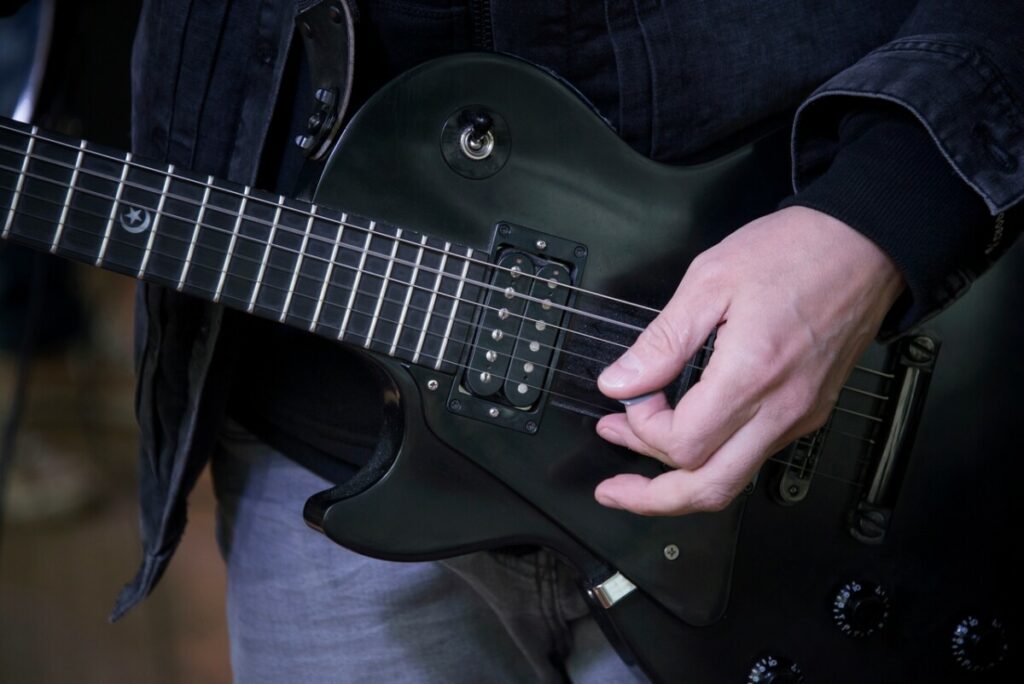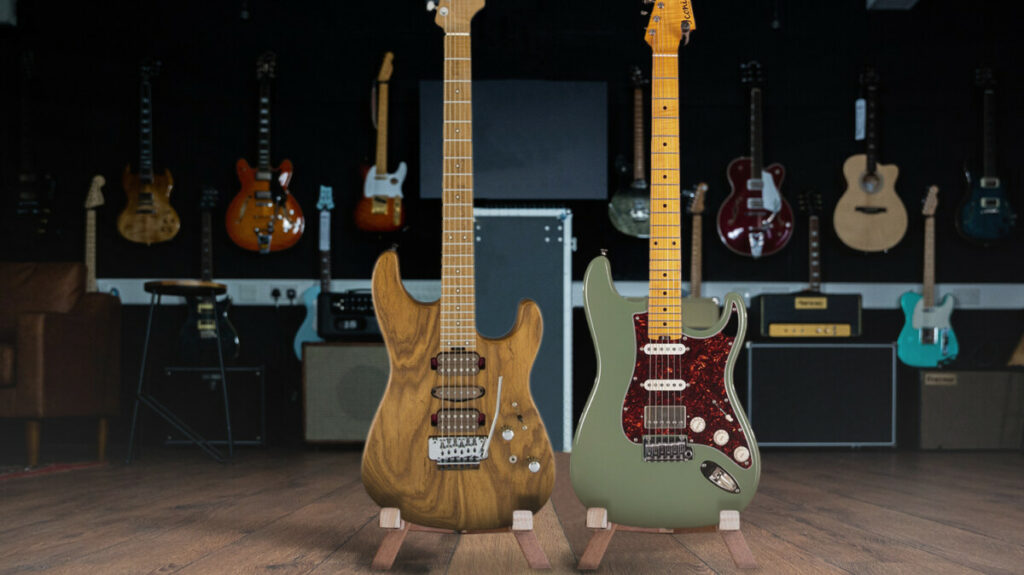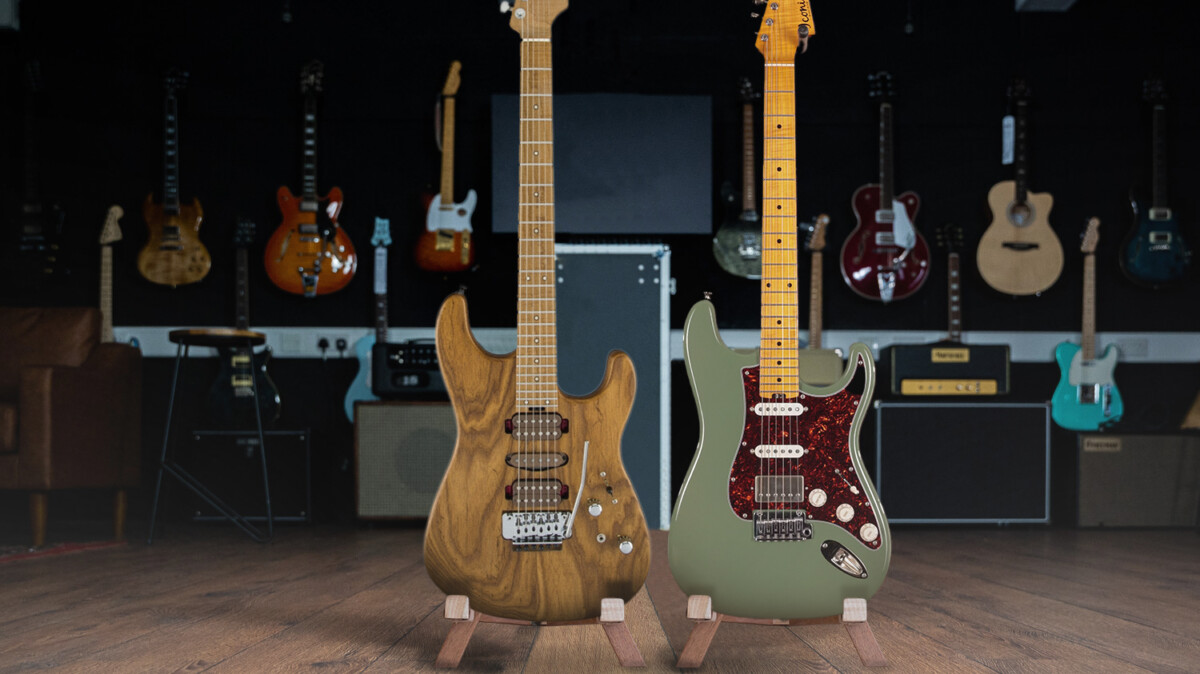Let’s get real, the choice of wood in a guitar is absolutely crucial. It’s pretty much the game-changer that shapes your instrument’s sound and feel.
We’re talking about basswood versus alder here – two powerhouses with their own set of perks and minuses.
So let’s dive into this intriguing face-off between basswood and alder. We’ll dissect what makes each one tick so you can nail down an informed decision for your next guitar investment.
Table of Contents
Characteristics of Basswood

Basswood guitars are a dream for anyone seeking smooth, rich sounds. This easy-to-handle lightweight wood packs a punch with its clear, long-lasting tones and lightness that doesn’t compromise quality.
Unlike other woods used in guitar crafting, basswood boasts an unrivaled texture creating a unique feel under your fingertips. With this comes soothing mellow vibes without losing any clarity or sustain – just what you need when jamming late into the night.
One distinctive feature lies in its stable grain structure; it’s like finding that trusty bandmate who’s always consistent yet never fails to amaze.
Benefits of Basswood
So, you’re wondering whether Basswood is good for guitars or not.
Well, Basswood rocks when it comes to guitar building. It’s got a killer combination of features like tone, lightness, and affordability that truly makes it stand out.
Check out these four major perks:
- It’s super lightweight, you can jam on your basswood guitar for hours without feeling weighed down.
- Its sound is rich and full – perfect for creating those warm vibes we all love in music.
- Basswood won’t break the bank. You’ll definitely get more groove for your green with this material.
- Plus, its durability means both newbie and pro players can rock hard without fear of damaging their instrument easily.
So yeah! Give basswood a shot while building your next guitar – I swear you won’t regret it!
Characteristics of Alder

Alder wood rocks for guitar crafting! It brings a nice balance in sound and is pretty sturdy. Plus, it’s lighter than basswood and won’t break your bank. With its medium-light density, alder is super easy to handle and mold into the perfect guitar shape.
You might be wondering about the grain. Well, it’s understated so you won’t see much of it when your sweet axe is all done up.
Comparing weight between alder and basswood? Alder wins hands down – being 10-15% lighter. And talking dollars here; this baby costs less than basswood making it an ideal pick if you’re watching your spending but still want quality gear.
And let’s not forget that rich warm tone that makes alder a favorite among musicians across genres – from blues to jazz to rock!
So whether you’re jamming on stage or shredding at home, an alder-built guitar can certainly help hit those high notes!
Benefits of Alder
Alder wood is the real MVP for crafting guitars. It’s light as a feather but don’t be fooled – it delivers killer tone clarity like no other! Imagine all the perks you get from a basswood guitar, and then amp up the definition and precision even more.
If you’re a guitarist on the hunt for an instrument that isn’t just about looks, alder should definitely be on your radar. Many people also ask a lot about Ash vs Alder and which one is better, so you might need to consider that as well if you want to decide on which guitar body is best for you.
Tone Clarity
Basswood trumps alder when it comes to impeccable tonal clarity. For the ultimate audio experience, basswood’s mid and high frequencies are delivered with unmatched precision, resulting in a strikingly bright sound that easily distinguishes itself in any mix. Plus, its perfect balance of warmth and protracted sustainment makes it fit for a plethora of musical styles.
Here are 4 major benefits you get from the crystal-clear tone of basswood:
- The assertive presence it brings to your mid and high-frequency sounds.
- Its radiant brightness ensures your music never gets lost in a mix.
- The well-rounded warmth expands your range of achievable sounds.
- A prolonged sustain quality facilitates an even smoother sound output.
With this collection of attributes, Basswood becomes the go-to choice for individuals seeking a vibrant yet clear tone that not only stands out but also offers extensive versatility across different musical genres.
Lightweight
Basswood is a dream to handle for any musician. It’s feather-light, making it an absolute breeze to work with or cart from gig-to-gig. Plus, this lightness has some serious perks when it comes to sound – think full-bodied and vivacious tones that can engulf the entire room. And let’s not forget about basswood’s stability despite its weight – perfect for crafting guitar bodies.
Alder on the flip side, though still lightweight compared with other woods out there, brings extra heft into the picture which isn’t necessarily a bad thing! The added weight grants alder more steadiness and amps up your music by giving you brighter tones. But remember guys, we’re comparing it here against our undisputed champion of lightness: basswood! So while Alder may be great in its own right; if portability tops your checklist then Basswood takes home gold every time!
Comparing Basswood Vs Alder

If you’re a guitar enthusiast figuring out which wood type suits your vibe, let’s dive into the battle of basswood vs alder.
Basswood is light as a feather on one hand and alder packs some weight on the other.
They both boast an array of sound dynamics and finishing styles but don’t miss these key differences:
- Alder, being denser, cranks up its resonance to deliver a fierce attack and prolonged sustain.
- On the contrary, basswood mellows down its tone for gentler attacks.
- If you’re hands-on with your instrument’s build process go for Basswood; it’s more compliant than alder.
- Alder may give you some hard time in getting that perfect finish but once done right, it’s durability game is strong!
Your ultimate pick between basswood or alder should reflect what kind of sound aesthetics you wish to achieve from your guitar. Both are versatile choices – all set to resonate with your musical spirit!
Choosing the Right Guitar Wood
Selecting the perfect guitar wood can feel like a huge task. You need to factor in not only how each type of wood alters your instrument’s sound but also their varying weights.
Armed with some solid research and understanding, you’ll be able to make an informed decision that truly elevates your music.
Tone Benefits
Alder’s rich, resonant sound elevates your guitar-playing session, offering a distinct feel compared to basswood. With its rigid nature, Alder enables you to hit each note with precision and delivers an intense bright tone.
Basswood has a bit more give, leading to a softer and mellow vibe that soothes the listener. Here are the key advantages of both woods:
- Alder: Amplifies a sharper focused tone for detailed note expression.
- Basswood: Renders a cozy warm tune with flexible handling.
- Alder: Produces an unmatched sound distinct from other guitar timbers.
- Basswood: Crafts smooth harmonious tunes ideal for classic rock melodies.
Your choice of guitar timber boils down to tonal properties and stiffness versus flexibility preference. If you want your music piece unique in every way then go for alder or if it’s all about soothing old-school rock notes then opt-in basswood.
Regardless of your pick between these two types of wood – rest easy knowing that they will deliver balanced acoustics suitable across different genres.
Weight Difference
You’ll definitely spot a difference in weight between the two – alder typically weighs less than basswood. This is a sweet perk if you’re on the hunt for an instrument that’s not going to break your back every time you move it.
Alder also scores big in durability, outlasting basswood by leaps and bounds. So, if longevity is what you seek in an instrument, alder might just be your top pick.
Yet when we talk about budget-friendliness, basswood takes home the trophy as it’s usually cheaper than alder.
In essence, both woods bring their own strengths and weaknesses to the table. Hence deciding which one fits your needs should involve weighing factors like long-term use and cost-effectiveness amongst others.
Frequently Asked Questions
What Is the Difference Between Basswood and Alder in Terms of Sound Quality?
When you’re jamming out, the sound of your guitar is key. Your choice between basswood and alder could make a big difference. Basswood is lighter in weight, delivering a softer more subtle melody. On the flip side, alder brings that full-bodied, warm resonance to your tunes.
How Does the Weight of Basswood and Alder Compare?
Ever wondered why some guitars feel different from others? Well, it’s all about what they’re made of! The Janka hardness rating and grain patterns can significantly influence their weight. While there isn’t much difference between them, basswoods tend to be slightly easier on arms owing to their lesser weight as compared to alders.
How Does the Price of Basswood and Alder Compare?
If budget matters (and let’s face it- when doesn’t it?), then consider this; generally speaking alder costs a bit more than basswoods. But hey! Don’t forget that final finishes might shake up those price tags too!
Is It Easy to Work With Either Basswood or Alder?
Whether you are painting Picasso with strings or just starting out in your garage band setup– both these woods are pretty user-friendly for crafting guitars due to their durability and wide tonal range.
Are Basswood and Alder Suitable for Different Types of Guitar Playing?
Absolutely yes! Each wood type has unique playability traits along with specific maintenance needs which makes either one better suited for certain styles of playing guitar over other types. Enjoy strumming bright melodies? Pick up a basswood. If warm tones get you grooving, an aldor won’t disappoint you!
Conclusion
Deciding on the perfect guitar wood largely hinges on your distinct taste.
If you’re into a more lightweight option that delivers an even, steady sound, basswood should be at the top of your list.
Contrarily, if it’s a richer and intricately layered tone you crave, alder is your best bet.
Intriguingly enough, many accomplished musicians have mentioned that they feel quite at ease with alder due to its marginally greater weightiness.
Regardless of the choice you make in wood selection, you can rest assured that it will yield an incredible acoustic performance built to endure.

